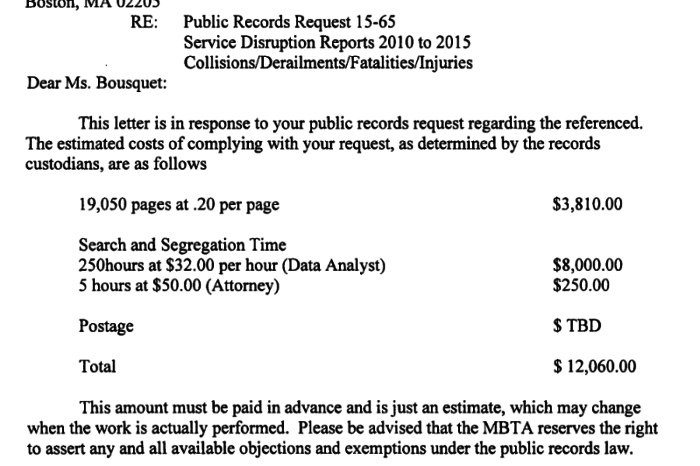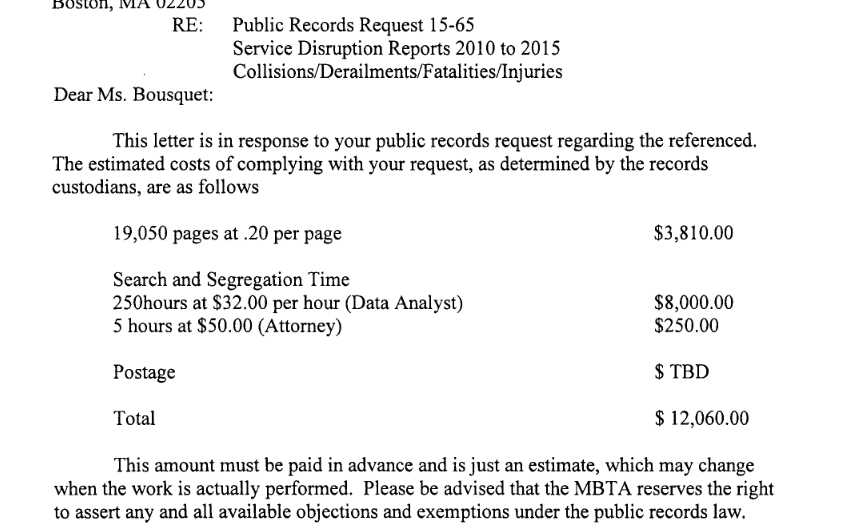The High Cost of Records Requests at the MBTA Hits a New Low
As we’ve written about before, in Massachusetts your legal right to transparency at times comes with a fairly hefty premium. Agencies routinely use exorbitant fee estimates as a way to get out of having to fulfill “burdensome” (read: embarrassing) requests, and no agency has been more consistently blatant about the practice than the MBTA.
Whether it’s tracking down their policies for firing an employee, rounding up emails of their departing GM, or even simply finding complaints about the infamous “strollercat,” the MBTA has successfully fought each request on the grounds that the process would be difficult, and therefore prohibitively expensive. For the requester, that is.
The MBTA has hit a new high (and low) with their response for a request for all service disruption reports regarding collisions, derailments, fatalities, or injuries over the last five years. The agency wants over twelve thousand dollars before it will begin to collect the documents, with nearly four thousand of that going towards printing costs.
Let’s start with the MBTA alleging that it needs to make physical copies of nineteen thousand pages of reports, at a generous rate of twenty cents a page. Ignoring for a second the fact that Massachusetts Public Records laws require that the records be presented in digital format, why is this information only available in printed format? If we were asking for records from the ’50s, that would help explain the necessity for carbon copies, but are we really supposed to believe that nobody in the last five years thought of putting this information into an Excel spreadsheet?
Secondly, why is it going to take a Data Analyst two hundred and fifty hours – over six full work weeks – to “search and segregate” these documents? These are standard reports, with a very specific name and a very specific scope. We’re talking at most the name of the report and a few Boolean operators. Even if the MBTA wasn’t obfuscating about the existence of digital records, putting together all of the reports that involved a fatality should take the better part of an afternoon, not a month-and-a-half of work.
As for the attorney’s five hours of review, we can’t speak to that. But we still happen to know what’s exempt from disclosure under public records law, since we took the five minutes to read it. Tell you what, MBTA, next time we’ll save you the two hundred and fifty hours and redact it ourselves – like we had to do that time you gave us a copy of the Keolis contract which included employee home phone numbers.
Last and definitely not least, this is information that should be in the hands of the public. Everybody knows that the T is in a sorry state of disrepair, and needs to be overhauled from the bottom up. Information like these reports puts a cost to that neglect – in lost time, lost money, and most sobering, lost lives.
Doesn’t the MBTA realize that by denying access to this information through direct or indirect action, it is denying its advocates the strongest tools in their arsenal to make the case that true reform is necessary, and soon? Like we said last week, transparency can exonerate as much as damn. This kind of shameful stonewalling does nothing except hurt the MBTA’s own case.
Get a clue, MBTA. Release the records.
J. Patrick Brown is the Editor of Muckrock.com, an organization which facilitates public record requests and serves as an independent news source covering government transparency issues nationwide.




